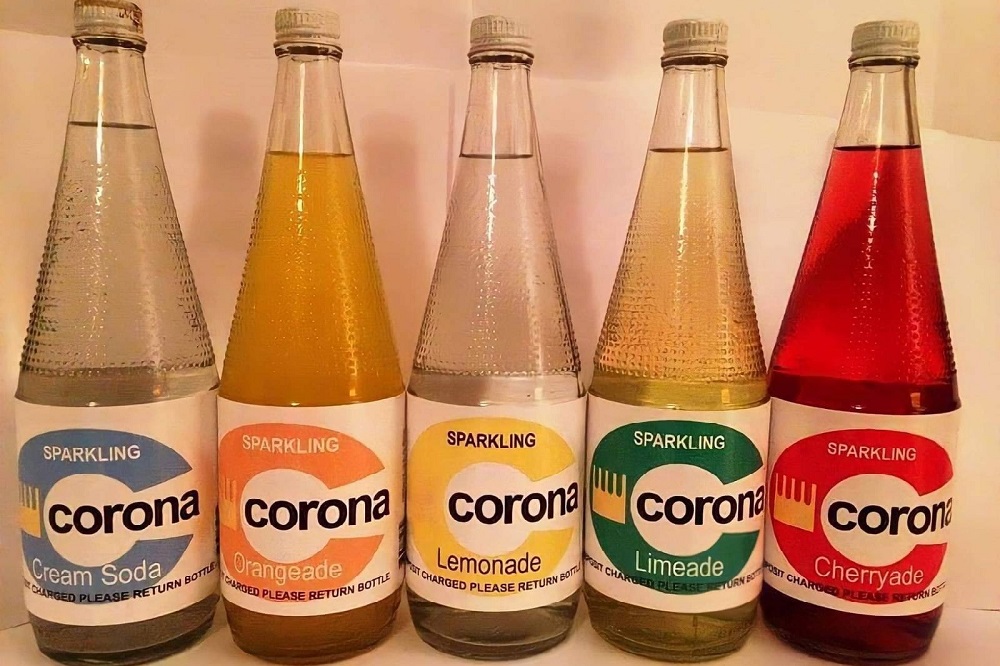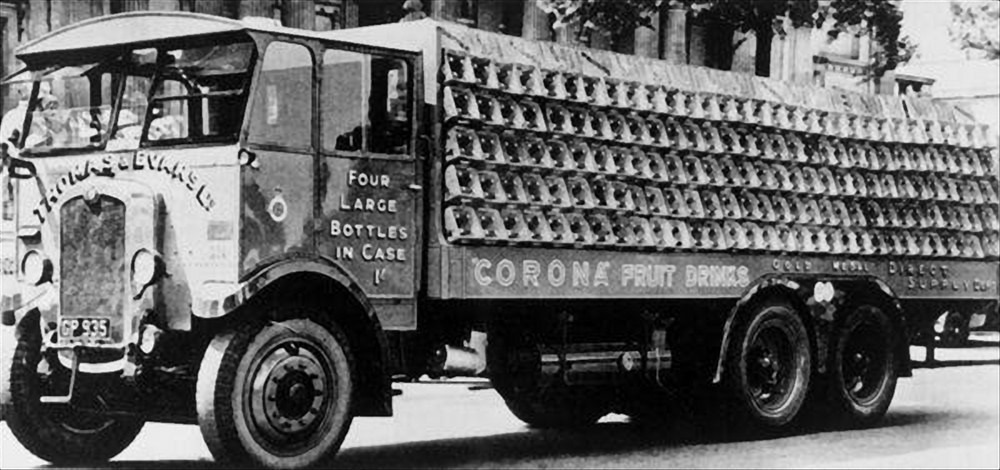A brief history of Welsh pop icon Corona

Revisiting an episode of ‘John on the Rhondda’, John Geraint explores the history of Corona pop and the iconic pop factory.
John Geraint
For last year, I’ve been entertaining the people of my native valley with a weekly radio talk which doubles up as a podcast – ‘John On The Rhondda’.
It draws on memories of growing up there, but I hope it’s more than a catalogue of hiraeth; it’s about how the Rhondda has changed, is changing, about the values the Valley has lived by and about how some of those values can help guide not just the Rhondda but the whole of Wales towards a better future.
Whether you come from the Rhondda or elsewhere in the valleys, or your family did, or you’d simply like to understand this very special part of the country better, I hope you’ll find something in what I have to say to pique your interest, and something to set you thinking about your Wales, our Wales.
Pop!
I’m going to begin with a single word, a word you might not associate with the Rhondda: if I said “Corona”, you might wonder if I was going to talk about the virus. But for people of my generation, in the Rhondda, and well beyond – across Wales and all over southern England – Corona means something else: pop!
Dandelion and Burdock, Cream Soda or plain Lemonade or Orangeade – whatever your favourite fizzy flavour was, a tall, sturdy glass bottle of Corona, with its big, distinctive capital C on the label… well, that was our idea of heaven.
They don’t make Corona pop anymore, but once upon a time it rivalled Coca-Cola and Pepsi across much of Britain: the most successful brand ever to come from the Rhondda.
If you’ve driven up into the Valley through Porth, you’ll have spotted that factory tower emblazoned with the words ‘Thomas and Evans, Welsh Hills Works’.
That’s where Corona began, as Welsh Hills Mineral Water.

A byword for quality
The story really starts with a boy from Pembrokeshire. William Evans was drawn to the Valleys in their Victorian heyday. Coal was King. Tens of thousands of others were moving in to be part of the boom – and they needed to be fed, so grocery businesses were booming too.
William Evans was apprenticed to a grocer called William Thomas in Aberbeeg, but young Master Evans was a quick learner, and ambitious with it. He opened a shop of his own and persuaded his boss to invest – and so ‘Thomas and Evans’ was born.
Pretty soon, he’d made enough money to buy William Thomas out of the business – but the trading name stuck: ‘Thomas and Evans’ it would always be.
William Evans opened another store, and another, up and down the Rhondda and across the coalfield: shop after shop. ‘Thomas and Evans’ became a byword for quality – and quantity!
They sold so much that they even had their own railway sidings, backing onto their headquarters in Porth, so that incoming foodstuffs could be loaded in bulk straight into their warehouse.
Take a walk down Porth’s main shopping thoroughfare, Hannah Street, today and you can still see the letters ‘T & E’ built into the façade at the top of the biggest shopfront of them all.
And it was there that, one day, something bizarre happened to William Evans, something that could only have happened in a place like the Rhondda was in those days.
A stranger walked in claiming – in an American accent – to be a Medicine Man. He’d been run out of Galveston Texas, he said – at gunpoint!
Well, Porth was a pioneering frontier town in its own right: it made some kind of sense for this drifter to fetch up there.
The man was certainly down on his luck. Starving, in fact. So he made a deal with William Evans: in exchange for a square meal, he promised to share the secret of making “mineral water the like of which your customers will never have tasted.”
Pop was popular
And that was how William Evans began making pop. Whether or not the recipe really came from Texas, Welsh Hills Mineral Water really did have something special about it. Everyone got a taste for it.
That factory in Porth was built to cope with the demand. And when times got tough, William Evans hit on the idea of door-to-door delivery. The pop man would pop round, just like the milkman. Even if your purse was nearly empty, it was hard to say ‘no’ to a treat brought to your own doorstep.
And William Evans’s pop was popular! Soon it was being marketed beyond the borders of Wales. ‘Welsh Hills’ didn’t have the right cachet to attract customers in the English Midlands, so William Evans organised a competition, challenging his staff to come up with a new brand name, and offering a grand prize of £5 for the winner.
The big man appointed his senior colleagues as judges, and when they chose ‘Corona’, William Evans smiled and said, “in which case I will keep my £5.” It was his own entry. That’s businessmen for you. Canny? Shrewd? Mean?
Whatever he was, William Evans made his fortune from Corona pop. He never moved out of the Rhondda, though he lived in some style for a Baptist deacon, in a mansion called Bronwydd, not far from his business empire’s headquarters in Porth.
After his days, he gifted the surrounding parkland to the people of Porth, and his family home became council offices.
‘FIZZical’
Back in the 1980s, I filmed a BBC drama-documentary there telling the extraordinary story of his life, and it was a real eye-opener to turn the offices back into the Edwardian splendour of a businessman’s palace by the magic of television.
By the 1940s, Corona was selling an astonishing 70 million bottles of pop a year – not bad for something that originated in a chance conversation with an American quack doctor on a street in Porth.
But the company passed out of the hands of William Evans’s family, sold to the Beecham Group in 1958 and subsequently to Britvic.
Despite of one of the most memorable advertising campaigns of the 1970s – “Every bubble’s passed its FIZZical!” – Corona got overtaken by trendier soft drinks, some with big bucks from across the Atlantic to lavish on their marketing.
Assets
Corona stopped trading before turn of the Millennium, though you can still buy one of the company’s offshoot brands, Tango, in a whole variety of flavours that I’m sure William Evans would have approved of.
But it’s a frustrating end to an epic story – because, as with the wealth generated by our coal, I often wonder how rich the Rhondda would be today if only we’d held on to the assets and the profits created here, by the ingenuity of people like William Evans and the hard work of his employees.
There’s a lesson in that for every business in Wales.
Anyway, the next time you hear the word ‘Corona’, rather than something worse, you can imagine a big bottle of pop.
Ah, but which flavour? For me, every time, it’s got to be Dandelion and Burdock.
All episodes of the ‘John On The Rhondda’ podcast are available here
This article is an edited extract of John Geraint’s new book ‘Up The Rhondda’ published by Y Lolfa and available from any good bookshop or directly from the publishers here………
Support our Nation today
For the price of a cup of coffee a month you can help us create an independent, not-for-profit, national news service for the people of Wales, by the people of Wales.






Don’t forget the money back on the bottle and the ingenious metal and china caps! Recyclability before the word was dreamt up!
Of course, as kids, we never sneaked into the backyard of one pub, ‘liberated’ a few empty Corona bottles, then took them to the back door of another pub for the money back on returned bottles.
We never, EVER, spent the money gained on sweets!
Oh no, we never did that!
Yep I remember them well lasted longer than alpine
Nowadays the closest I can get to the Corona limeade of my youth is Roses Lime Cordial and fizzy mineral water. Everything else has sweeteners and I prefer the sugar!
I can remember as a child in the early 80s seeing a Corona flatbed lorry rumble down my street, stop, and sell bottles off the back.. I csn recall it had that unique sound of bottles clinking together , a bit like a milk float, and when me, my brother & sisters heard it would run outside all excited with a fist full of pennies. I particularly liked the Lime, Dandelion & Burdock and Raspberry flavoured pop. Fond memories.